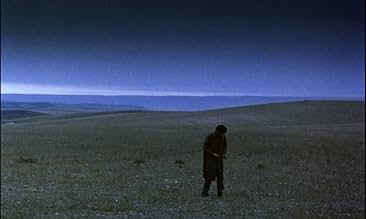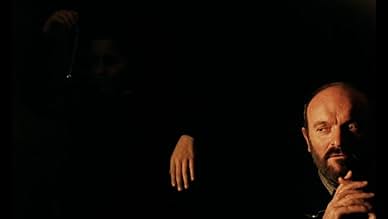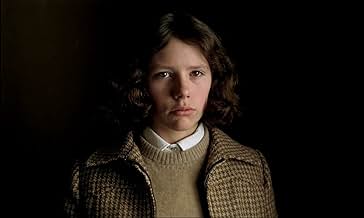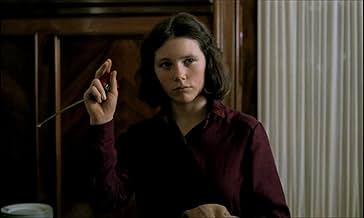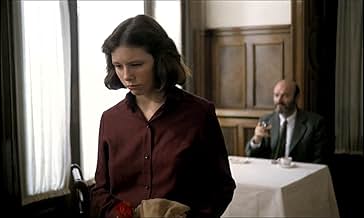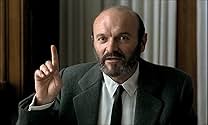A woman reflects on her childhood relationship with her father, attempting to understand the depths of his despair and the truth of his myths.A woman reflects on her childhood relationship with her father, attempting to understand the depths of his despair and the truth of his myths.A woman reflects on her childhood relationship with her father, attempting to understand the depths of his despair and the truth of his myths.
- Director
- Writers
- Stars
- Awards
- 7 wins & 2 nominations total
Aurore Clément
- Irene Ríos
- (as Aurora Clement)
- …
María Massip
- Estrella adulta
- (voice)
José Luis Fernández 'Pirri'
- Carioco
- (voice)
- (uncredited)
José García García Morilla
- Chófer
- (uncredited)
Chus Lampreave
- Casilda
- (uncredited)
Jesús Nieto
- Agustín Arenas- voz
- (uncredited)
- Director
- Writers
- All cast & crew
- Production, box office & more at IMDbPro
Featured reviews
10ay9a
It must be almost twenty years since I saw this movie (and I saw it only once, when I was in Japan), but the memory of this movie remains in me like an old haunting dream from childhood. Cinematography at its best. I think, for the first time, this film made me think that the best media for poetry is not words, but vision.
I would want to recommend this to anyone who loves "Spirit of the Beehive" and thinks it cannot be surpassed. But alas, I don't know how you get this movie in USA with English subtitle.
I would want to recommend this to anyone who loves "Spirit of the Beehive" and thinks it cannot be surpassed. But alas, I don't know how you get this movie in USA with English subtitle.
10zetes
I don't really keep a list of most-wanted-but-unavailable movies, but, if I did, this film, the second of only three features of Victor Erice, director of Spirit of the Beehive, would have been very high on it. It is, to understate, far from a disappointment. Very much a sister film to Spirit, it's about a woman, Estrella, who as a narrator remains off screen, reminiscing about her relationship with her father (Omero Antonutti). As a child (where she is played by Sonsoles Aranguren), she worshiped the man. Behind the perceived god, though, he was quite a sad man, haunted by history. Estrella discovers a particular secret which dominates the man's mind. In her teenage years (where she's played by Iciar Bollain), that secret comes back. This is an achingly gorgeous film, very quiet and largely shot in shadowy, cold sunlight. The images are every bit as gorgeous as Spirit's, and the story is, too. Criterion apparently owns the rights to this. Many of the films that are only streaming on Hulu will never see a home video release, but they really should put this one out there. It's a masterpiece.
This story unfolds in delicate time in the history of modern Spain, as well as during a precarious time in the life of a family.
Adolescent Estrella lives in awe of her mysterious and magical father, wonderfully played by Omero Antonutti, and weary of her ever-practical mother and of their isolated life in the misty and brooding northern countryside. Estrella's fascination with her father turns to intrigue- and then to obsession- when she discovers that her father has a secret, and realizes that she is only one facet of her father's life and not the central figure, as he is to her.
After a ray of sunshine is cast into her dark and insular life by the visit of one of her father's aunts (played by the late Rafaela Aparicio in one of her best roles), Estrella yearns to capture more of the essence of her father by one day visiting "el sur" (the south)his home territory.
As Estrella enters the awkward realm of adolescence, she grows apart from her father emotionally. A tragic turn of events condemns him to remain a mythical figure for hersomeone she wonders if she ever knew at all. The supreme irony is that she is very like him.
This film is captivating, both visually and emotionally, and the audience becomes just as absorbed in the story as the characters themselves. It is one of those films whose imagery will always stay in one's memory, such as in the my favorite scene, where father and daughter sit distantly across a table from each other in an old café, listening to the eerie sound of a "pasodoble" that wafts from a wedding in another room, bringing memories of happier, simpler days.
Adolescent Estrella lives in awe of her mysterious and magical father, wonderfully played by Omero Antonutti, and weary of her ever-practical mother and of their isolated life in the misty and brooding northern countryside. Estrella's fascination with her father turns to intrigue- and then to obsession- when she discovers that her father has a secret, and realizes that she is only one facet of her father's life and not the central figure, as he is to her.
After a ray of sunshine is cast into her dark and insular life by the visit of one of her father's aunts (played by the late Rafaela Aparicio in one of her best roles), Estrella yearns to capture more of the essence of her father by one day visiting "el sur" (the south)his home territory.
As Estrella enters the awkward realm of adolescence, she grows apart from her father emotionally. A tragic turn of events condemns him to remain a mythical figure for hersomeone she wonders if she ever knew at all. The supreme irony is that she is very like him.
This film is captivating, both visually and emotionally, and the audience becomes just as absorbed in the story as the characters themselves. It is one of those films whose imagery will always stay in one's memory, such as in the my favorite scene, where father and daughter sit distantly across a table from each other in an old café, listening to the eerie sound of a "pasodoble" that wafts from a wedding in another room, bringing memories of happier, simpler days.
Victor Erice's little masterpiece earned itself a permanent place in the repertoire of Spanish film-making. Not surprisingly: Franco was dead and Spain had bravely struggled out of a difficult transition to form a now much-respected democratic and modern nation. If art - whether literature or cinema - is to reflect that important step in a country's advance, perhaps "El Sur" (The South) is one of the four or five Spanish films of the last twenty five years which best marked that change.
Beautifully filmed in natural lighting, even in the interior of an old rural house (Ezcaray, La Rioja), the deep feelings transmitted between daughter and father reveal a delicacy so often missing in more banal entertainment. Young Sonsoles Aranguren and Icíar Bollaín play delicious roles which swing rather uncertainly from late adolescence to young womanhood as the daughter who attempts to fathom out her father (and in so doing, herself) with an extraordinarily powerful performance which obliges the intelligent viewer into the film. And Omero Antonutti plays the exact counterpart, carefully balancing his role such that he never overshadows his "daughter's" interpretation. The scenes and dialogues are enchanting, never over-acted or otherwise exaggerated; at all moments Erice maintains full control over the film's development, giving just enough touch of exquisiteness and sensitivity, allowing the film to move unhurriedly through simple but moving scenes to the predictable outcome.
Here indeed is moving theatre-cinema: the understanding spectator will leave with a certain mixture of feelings if he knows a little of Spain and its people; he will not leave unmoved, cold.
Beautifully filmed in natural lighting, even in the interior of an old rural house (Ezcaray, La Rioja), the deep feelings transmitted between daughter and father reveal a delicacy so often missing in more banal entertainment. Young Sonsoles Aranguren and Icíar Bollaín play delicious roles which swing rather uncertainly from late adolescence to young womanhood as the daughter who attempts to fathom out her father (and in so doing, herself) with an extraordinarily powerful performance which obliges the intelligent viewer into the film. And Omero Antonutti plays the exact counterpart, carefully balancing his role such that he never overshadows his "daughter's" interpretation. The scenes and dialogues are enchanting, never over-acted or otherwise exaggerated; at all moments Erice maintains full control over the film's development, giving just enough touch of exquisiteness and sensitivity, allowing the film to move unhurriedly through simple but moving scenes to the predictable outcome.
Here indeed is moving theatre-cinema: the understanding spectator will leave with a certain mixture of feelings if he knows a little of Spain and its people; he will not leave unmoved, cold.
A beautiful movie, even if I am not a Spaniard, and the historical perspective doesn't ring too much of a bell.
I would look at the movie as a relationship between a father and a daughter, and there for any father of a daughter (if both are sensitive and a bit introvert / taciturn), it would ring bells.
Father (only mentioned) and Son are on the opposite sides (of civil war, but that is not important), and the antagonism of their espoused cause permeates into their personal relation ship, and the son is thrown out/ moves out.
Wandering around for some time, he finally settles down at a remote place, opposite to his father's (north vs South, Freezing temperature Vs hot weather), with his wife and small daughter. He is the doctor in that small town, and people (and daughter), believe he has mystic powers (he might have).
There are mysteries in his life, some of which his wife knows (probably she knows most), but naturally not the young daughter (she was 8), which makes him more mysterious and interesting for her.
By accident she comes to know that there was another woman in his life (definitely before marriage), whom he had forsaken, but not forgotten. When she is again reminded (she is a starlet, and her one of the movies had been screened on the town), the longing and the memories awake. He is now in a dilemma, one side is his old flame (Irene), on the other, wife and daughter. He hovers on the edge, to abandon which side and jump on to which.
Had the movie been completed, probably I would have known some missing links - the actual story between Laura (screen pseudonym Irene Rios) and Agustin. But even without that it doesn't compromise the plot. It is just that he had been in love, got jealous (probably there was some one else too), and then got married and left the girl and the place. She could be instrumental in that as much as his father was, but that is my guess. In the movie, despite all misunderstandings, the flame burned in him, and another one was of the wife and daughter. Which one to extinguish ? It has a strong angle on the father - daughter relationship and the lack of communication in case of both being introvert - and the ill effects of such relation, especially in crisis. It has a close relationship with many - including the author of Mary Poppins (and her relation with her father). In fact, one could almost say it is P L Travers's biography. At least as much we know of it (except only probably the other woman angle).
Had the movie been completed, probably I would have known some missing links - the actual story between Laura (screen pseudonym Irene Rios) and Agustin. But even without that it doesn't compromise the plot. It is just that he had been in love, got jealous (probably there was some one else too), and then got married and left the girl and the place. She could be instrumental in that as much as his father was, but that is my guess. In the movie, despite all misunderstandings, the flame burned in him, and another one was of the wife and daughter. Which one to extinguish ? It has a strong angle on the father - daughter relationship and the lack of communication in case of both being introvert - and the ill effects of such relation, especially in crisis. It has a close relationship with many - including the author of Mary Poppins (and her relation with her father). In fact, one could almost say it is P L Travers's biography. At least as much we know of it (except only probably the other woman angle).
50 Top Rated Spanish-Language Movies
50 Top Rated Spanish-Language Movies
See which classic and contemporary movies have landed on our list of top rated Spanish-language movies according to fan votes on IMDb.
Did you know
- TriviaDirector Víctor Erice considers this to be an unfinished project. The original script consisted of more than 400 pages and was scheduled to be shot in 81 days. 48 days into shooting, when production was to be moved to the south of Spain, producer Elías Querejeta unexpectedly suspended the project, allegedly because of financing objections by Televisión Española, the backing television network. However, Querejeta revealed years later that he made the decision because he thought the film was complete with what they'd shot so far.
- ConnectionsFeatured in The Footprints of a Spirit (1998)
- SoundtracksLa puerta del Sagrario
Composed by Enrique Granados
- How long is El Sur?Powered by Alexa
Details
- Release date
- Countries of origin
- Official site
- Language
- Also known as
- The South
- Filming locations
- Production companies
- See more company credits at IMDbPro
Box office
- Gross worldwide
- $22,720
Contribute to this page
Suggest an edit or add missing content

